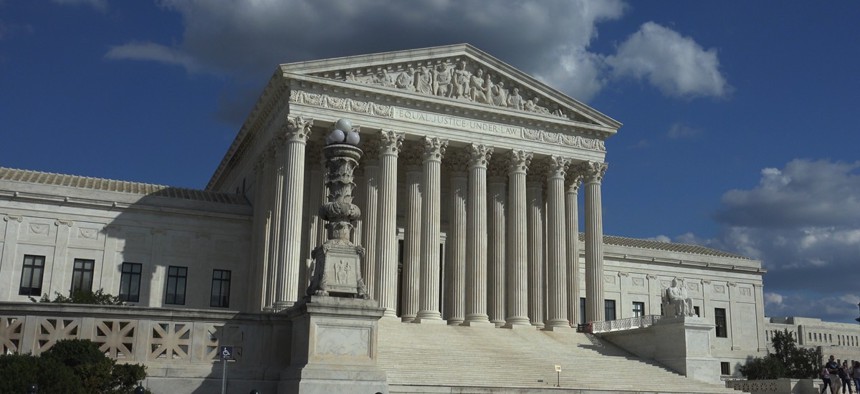North Carolina's Voter ID Law Is Defeated, For Now

The United States Supreme Court.
The Supreme Court declined to review the law that lower courts found to be discriminatory, but made no judgment on the merits of the policy.
North Carolina voters probably won’t have to worry about a return of strict voter-ID tests any time soon. Monday, the Supreme Court announced that it would not hear arguments in North Carolina, et al. v. North Carolina State Conference of the NAACP, et al. That case was petitioned by Republican state officials, including then-Governor Pat McCrory, after the Fourth Circuit court found last year that a package of 2013 voting reforms, including the establishment of a strict voter-ID requirement and restrictions on early voting and same-day registration, “were enacted with racially discriminatory intent.”
The Supreme Court didn’t consider the merits of the case in its denial of the petition for writ of certiorari. Functionally, that doesn’t matter much for voters in North Carolina, who will likely finally have some measure of stability in upcoming elections, after a hectic 2016 election cycle that featured the Fourth Circuit’s decision, a last-minute scramble to reestablish pre-2013 provisions, a push by local officials to disregard those provisions, a catastrophic storm just days before the election, and a drop-off in early voting among black voters.
The Fourth Circuit’s decision now stands, as does its assessment that the voter-ID law purposefully diminished ballot access for communities of color. Research the General Assembly itself commissioned found that minority communities were more likely to lack access to proper identification and more likely to use ballot-extended practices like early voting. With Democratic Governor Roy Cooper now in office, it seems unlikely that General Assembly Republicans—who crammed the bill through in the hours after the Supreme Court’s Shelby County v. Holder decision severely weakened federal oversight over state election laws—will be able to craft a replacement that could obtain his signature.
Voting-rights activists and Democrats claimed a victory with the Court’s decision. Voting-rights organization Campaign Legal gave a press release stating “it is a huge victory for both North Carolina voters and the country that the Supreme Court will not review the Fourth Circuit’s decision striking down these restrictive laws.” Democratic National Committee Chairman Tom Perez also celebrated the decision in a statement, saying “this is a huge victory for voters and a massive blow to Republicans trying to restrict access to the ballot, especially in communities of color.”
Still, the words of Chief Justice John Roberts should temper enthusiasm about the future of challenges to voter-ID laws and similar voter-suppression schemes. Roberts wrote nothing of the logic of the voter-ID law itself, and his closing statement that “it is important to recall our frequent admonition that ‘[t]he denial of a writ of certiorari imports no expression of opinion upon the merits of the case,’” reads more as an invitation to future consideration than a note of finality.
While no explicit reason for the denial was given, Roberts took care to note the lengthy legal wrangling in the state over just who was authorized to petition the Court. When the state lost in the Fourth Circuit and appealed, it did so as a solid Republican bloc. McCrory and the Republican-controlled State Board of Elections were the petitioners. But after Cooper was elected governor—and after a political showdown involving a legislative “coup” by the Republican-dominated General Assembly against him—Cooper and state Attorney General Josh Stein announced the state would be withdrawing from the petition. Leaders in the General Assembly objected that the move was illegal under state law, and attempted to intervene on the state’s behalf.
The original plaintiffs alleged that the General Assembly had no legal method to intervene, and much of the legal proceedings since have centered on whether the petitioners on file even have standing. By Roberts’s own writing, it appears the Court denied review based on the “blizzard of filings over who is and who is not authorized to seek review in this Court under North Carolina law” as much as anything else.
Should state law or some revision of it under the General Assembly create more clarity as to standing or the right to represent the state, or if in the future the state government is more solidly Republican, the merits of the case or a future similar law could again find themselves before the Court. The state GOP threatened as much in their own statement, saying that “while Governor Cooper and Attorney General Stein have stymied voter I.D. for now, they will ultimately lose in their efforts to block North Carolina citizens from having these protections."
The next battle may not originate in the state itself. The North Carolina voter-ID law is similar to a Texas law that has also had a long life in courts, and has been found to have discriminatory effect by the Fifth Circuit. The question of the discriminatory intent of the law, although recently confirmed by a district court, is likely to reappear before the Fifth Circuit and then the Supreme Court, and there the Court’s considerations could have wide implications for implementation of voter ID, including North Carolina’s own law.
The Supreme Court’s decision also isn’t the end of North Carolina’s immediate voting-rights controversies. Both state and federal congressional districts are currently under the Court’s review, and in January the Supreme Court blocked an order from a trial court that called for special elections for state legislature seats it deemed unconstitutional gerrymanders. In all, it appears unlikely that the legal saga over voting in the state is anywhere close to finished.
Vann R. Newkirk II is a staff writer at The Atlantic, where this article was originally published.
NEXT STORY: How Prosecutors Are Responding to Shifting Views on Marijuana





